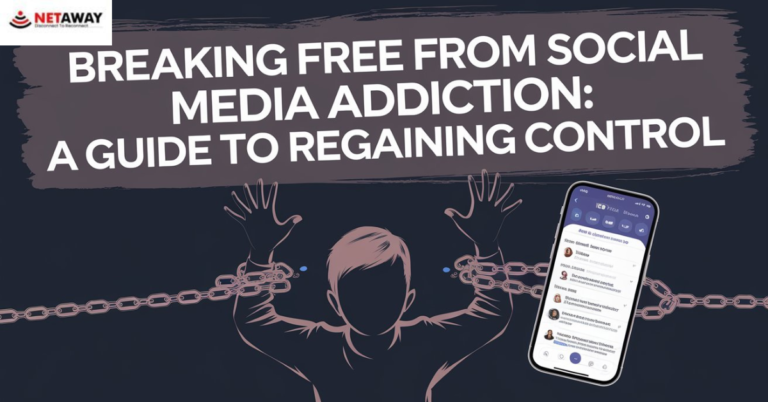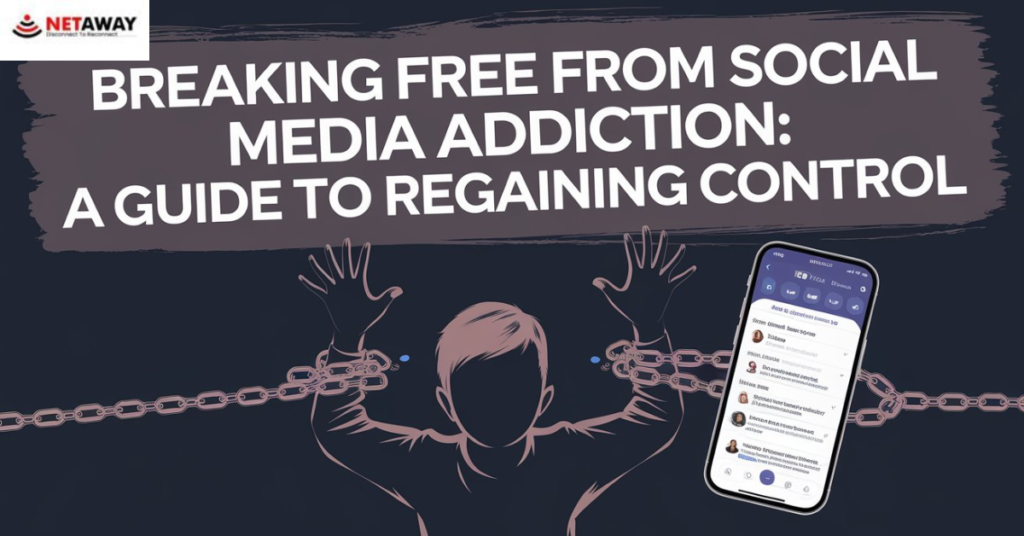

Introduction to Social Media Addiction and Its Prevalence
In today’s digital age, social media has become an integral part of our daily lives. Whether it’s checking updates on Facebook, scrolling through Instagram, or watching TikTok videos, social media platforms have an undeniable grip on our time and attention. But what happens when this engagement turns into an addiction? Social media addiction is a growing concern, affecting millions of people worldwide. This article aims to provide a comprehensive guide to understanding, addressing, and overcoming social media addiction, helping you regain control over your digital life.
What is Social Media Addiction?
Understanding the Psychological Mechanisms Behind Social Media Use
Social media addiction is characterized by an excessive and compulsive need to use social media platforms, often at the expense of other important activities like work, study, or real-life social interactions. This behavior is driven by complex psychological mechanisms, including the need for validation, fear of missing out (FOMO), and the rewarding nature of social media interactions.
Signs That You Might Be Addicted to Social Media
- Constantly checking your phone for updates, even in the middle of the night.
- Spending more time on social media than planned, often losing track of time.
- Feeling anxious or irritable when unable to access social media.
- Neglecting responsibilities, work, or real-life relationships due to excessive social media use.
- Using social media as a way to escape or avoid real-life problems.
The Impact of Social Media on Mental Health
The Link Between Social Media Use and Anxiety, Depression, and Loneliness
Numerous studies have shown a correlation between excessive social media use and mental health issues such as anxiety, depression, and loneliness. The constant comparison to others’ seemingly perfect lives can lead to feelings of inadequacy and low self-esteem, while the lack of meaningful interactions can exacerbate feelings of loneliness.
The Effects of Social Media on Self-Esteem and Body Image
Social media is often a highlight reel, showing only the best moments of people’s lives. This can lead to unrealistic expectations and pressure to conform to certain standards, particularly regarding body image. Constant exposure to edited and filtered images can negatively impact self-esteem, leading to body dissatisfaction and unhealthy behaviours.
Why It’s Hard to Disconnect
The Role of Dopamine in Social Media Addiction
Social media platforms are designed to keep users engaged by triggering the release of dopamine, the brain’s “feel-good” chemical. Every like, comment, or share provides a small hit of dopamine, reinforcing the behavior and making it difficult to stop.
How Social Media Platforms Are Designed to Keep You Hooked
Social media platforms employ various tactics to keep users engaged, including endless scrolling, personalized content, and notifications that create a sense of urgency. These design elements are intentionally created to maximize time spent on the platform, making it challenging to disconnect.
Steps to Overcome Social Media Addiction
Recognizing and Admitting the Problem
The first step in overcoming social media addiction is recognizing that you have a problem. Acknowledging the negative impact it has on your life is crucial for taking the necessary steps to regain control.
Setting Clear and Achievable Goals for Social Media Use
Create specific goals for your social media use, such as limiting screen time to a certain number of hours per day or designating specific times for checking social media. Setting clear boundaries can help you regain control over your time and attention.
Using Apps and Tools to Monitor and Limit Screen Time
Several apps and tools can help you monitor and limit your social media use. These tools provide insights into your screen time, set limits, and even block access to social media during designated times.
Creating a Balanced Relationship with Social Media
Establishing Tech-Free Zones and Times
Designate certain areas of your home, like the bedroom or dining room, as tech-free zones. Similarly, establish tech-free times, such as during meals or an hour before bed, to help you disconnect and focus on real-life interactions.
Prioritizing Real-Life Interactions Over Online Connections
Make a conscious effort to prioritize face-to-face interactions over online ones. Spend more time with friends and family, engage in activities that don’t involve screens, and nurture your real-life relationships.
Practicing Mindfulness While Using Social Media
When using social media, be mindful of your emotions and behaviors. Notice when you’re using it out of habit or as a way to avoid something else. Practicing mindfulness can help you use social media more intentionally and less compulsively.
Developing New Habits and Interests
Exploring Offline Hobbies and Activities
Find activities that you enjoy and that don’t involve screens, such as reading, exercising, cooking, or gardening. Developing new hobbies can help fill the void left by reducing your social media use and provide a sense of fulfillment.
Building a Routine That Doesn’t Revolve Around Social Media
Create a daily routine that prioritizes offline activities, such as morning walks, reading, or spending time with loved ones. By building a life that doesn’t revolve around social media, you’ll find it easier to disconnect.
Finding Alternative Ways to Stay Informed and Connected
Consider subscribing to newsletters, reading newspapers, or listening to podcasts as alternative ways to stay informed. To stay connected with friends and family, use messaging apps, phone calls, or in-person meetings.
The Role of Support Systems in Recovery
Involving Friends and Family in Your Social Media Detox
Share your goals with friends and family and ask for their support. They can help keep you accountable, encourage you to stick to your limits, and provide a sense of connection that doesn’t rely on social media.
Joining Support Groups or Online Communities Focused on Digital Well-Being
Consider joining support groups or online communities dedicated to digital well-being. These groups can offer valuable resources, encouragement, and a sense of community as you work towards overcoming your addiction.
Seeking Professional Help When Necessary
If you find it difficult to overcome social media addiction on your own, don’t hesitate to seek professional help. Therapists and counselors can provide the tools and support needed to address underlying issues and develop healthier habits.
Long-Term Strategies for Preventing Relapse
Regularly Assessing Your Social Media Use
Periodically assess your social media use to ensure you’re maintaining a healthy balance. If you notice old habits creeping back in, take immediate action to address them.
Maintaining the Boundaries You’ve Set
Stick to the boundaries you’ve established for social media use. Regularly revisit and adjust them as needed to ensure they continue to support your well-being.
Continuously Exploring and Adapting New Healthy Habits
As you progress in your recovery, continue to explore and adopt new healthy habits. This will help you stay engaged in life outside of social media and reduce the temptation to relapse.
Real-Life Experiences
Stories of Individuals Who Have Successfully Overcome Social Media Addiction
Hearing from individuals who have successfully overcome social media addiction can be incredibly inspiring. These stories highlight the challenges they faced, the strategies they used, and the positive changes they experienced as a result.
Lessons Learned and Tips from Those Who Have Been There
Those who have successfully overcome social media addiction often have valuable insights and tips to share. Their experiences can provide guidance and motivation for others on the same journey.
Conclusion
Breaking free from social media addiction is a challenging but rewarding journey. By recognizing the problem, setting clear goals, and establishing healthy habits, you can regain control over your digital life and create a healthier relationship with social media. Take the first step today towards a more balanced, fulfilling life.
FAQs
Q: What are the first steps to take if I suspect I’m addicted to social media?
A: Start by recognizing and admitting the problem. Then, set clear goals for reducing your social media use, and consider using apps or tools to help monitor and limit your screen time.
Q: How can I balance my social media use with my real-life responsibilities?
A: Establish tech-free zones and times, prioritize real-life interactions, and create a routine that doesn’t revolve around social media. These steps can help you strike a balance.
Q: Is it necessary to quit social media completely to overcome addiction?
A: Not necessarily. The goal is to create a balanced relationship with social media. You can reduce usage without quitting entirely by setting limits and using it more mindfully.
Q: Can professional help assist in overcoming social media addiction?
A: Yes, seeking help from a therapist or counselor can be beneficial, especially if you’re struggling to make progress on your own.Q: How can I prevent a relapse into social media addiction?
A: Regularly assess your social media use, maintain the boundaries you’ve set, and continuously explore and adapt new healthy habits to prevent relapse.
